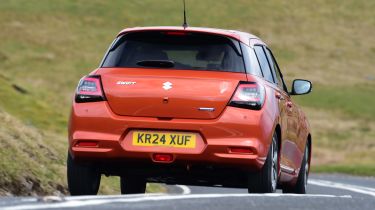Suzuki Swift - MPG, emissions & running costs
The lightweight Suzuki Swift won’t cost much to tax or refuel, but insurance is unnecessarily high for the class

| Model | MPG | CO2 | Insurance group |
| Swift 1.2 Motion | 64.2mpg | 99g/km | 27D |
| Swift 1.2 Ultra ALLGRIP | 57.6mpg | 110g/km | 25D |
| Swift 1.2 Motion CVT | 60.1mpg | 106g/km | 28D |
Buyers of superminis like the Suzuki Swift expect good fuel economy, and the 64.2mpg figure for the regular front-wheel drive models should mean this is one small car that’ll be light on your bank balance. Specifying the CVT automatic makes the Swift a little thirstier at 60.1mpg, while adding ALLGRIP four-wheel drive drops this further to 57.6mpg.
The frugality is helped because the Swift tips the scales at less than a tonne, making it nearly 350kg lighter than the hybrid MG3 and a whooping 750kg less than lardy electric cars like the latest MINI Cooper. While that can make the Suzuki feel a bit like a tin can at times, it works wonders for efficiency – we managed an easy 50mpg even after a brisk drive from the Cotswolds across to South Wales, and reckon 60mpg-plus would be a doddle in normal driving.
Tax
The Suzuki Swift has lower CO2 emission figures according to WLTP testing compared with traditional petrol rivals, starting at 99g/km for the front-wheel drive models, and going up to 110g/km for the four-wheel drive ALLGRIP. These emissions will affect the first year of road tax as part of the Swift's list price, but because all versions are well below the £40k road tax surcharge limit, it won't incur the extra cost.
Used - available now

2021 Suzuki
Swift
34,933 milesManualPetrol1.2L
Cash £9,900
2019 Suzuki
Swift
17,993 milesManualPetrol1.0L
Cash £9,506
2019 Suzuki
Swift
29,984 milesManualPetrol1.2L
Cash £9,100
2021 Suzuki
Swift
20,712 milesManualPetrol1.2L
Cash £11,383The Toyota Yaris and Renault Clio E-Tech produce slightly less CO2 but still fall into the same 24 per cent Benefit-in-Kind tax band. Those looking for a more affordable company car should consider the Peugeot E-208 and Vauxhall Corsa Electric.
Insurance groups
The Suzuki Swift that’s likely to cost the least to insure is the four-wheel drive 1.2 Ultra ALLGRIP in group 25, followed by the regular front-wheel drive 1.2 Motion and Ultra trims in group 27. The CVT automatic versions will be the most costly in group 28.
Unfortunately, this means that spec for spec, the Swift range is in much higher insurance groups than its rivals. It is two groups higher than the MG3 and is on par with electric superminis like the Peugeot E-208 and Vauxhall Corsa Electric.
For a supermini that’s cheaper to insure, you should look towards the entry-level Volkswagen Polo 1.0 Life in group three, or the Skoda Fabia 1.0 SE Comfort in group four. Meanwhile, the cheaper Renault Clio 1.0 TCe 90 Evolution is in group 10.
Check if your car needs an MoT and view its complete history with our MoT History Checker...
Depreciation
According to our experts, the Suzuki Swift should maintain around 52 per cent of its resale value over a typical three-year/36,000-mile ownership period. That’s a little better than some versions of Skoda Fabia, especially the entry-level 1.0 SE Comfort, which costs more than our preferred version of Swift.
To get an accurate valuation of a specific model, check out our free car valuation tool...








